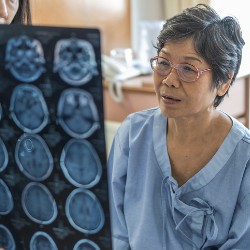UR CTSI Funds Investigation of Novel Drug Targeting Cancer Microenvironment
Tumors and cancer cells are not the only villains in cancer. They are surrounded by a host of cells and structures, called the cancer or tumor microenvironment, that help the cancer grow. A team of researchers at the Wilmot Cancer Institute (WCI) hopes to lay the foundation for a novel cancer therapy that would uncouple the cancer from its microenvironment support system with funding from a UR CTSI Incubator Award.
The team, led by Michael W. Becker, M.D., dean’s professor of Hematology/Oncology at WCI, previously identified a set of immune signaling proteins, called IRAK1 and IRAK4, that enhance the collaboration between cancer cells and their microenvironment. These proteins are also key players in a signaling pathway that appears to promote cancer growth and contribute to therapeutic resistance in some cancers.
Though an inhibitor of IRAK1/4 was commercially available, the team had difficulty being able to obtain it for their studies. Rakesh K. Singh, Ph.D., M.Phil., research associate professor of Obstetrics and Gynecology at URMC, improved upon the existing inhibitor to create a new proprietary inhibitor, called UR241-2. Previous studies suggest this candidate is highly effective at inhibiting IRAK1/4 in solution.
For their UR CTSI-funded incubator project, which kicked off in July, the team is testing whether UR241-2 can also inhibit IRAK1/4 in cells and animals. So far, they have found that the compound can disrupt the collaboration between cancer cells and their microenvironment in cellular models of two blood cancers (myelodysplastic syndrome and acute myelogenous leukemia) and pancreatic cancer.
The team chose these models because each of these cancers are highly incurable and affect a lot of people. A wealth of good science also suggests IRAK1/4 plays an important role in these cancers by helping cancer cells multiply.
Currently, the team is studying UR241-2 toxicity, whether it targets the appropriate cells and proteins, whether it can sufficiently inhibit IRAK1/4 and if it has off-target effects in the cancer cell models, leukemic mice and bone marrow biopsies from patients. Next, they intend to investigate how well UR241-2 impairs tumor growth in these models, hoping to eventually move this research into early phase clinical trials with the ultimate goal of advancing patient care.
The team, which also includes, Laura M. Calvi, M.D., the SKAWA Foundation Professor in Endocrinology and Metabolism, and Aram F. Hezel, M.D., the John and Ethel Heselden Professor and Chief of Hematology/Oncology, have already leveraged their incubator findings to apply for further funding. They also have an ongoing patent application for UR241-2, and plan to submit further grant proposals within the next two years to keep this research moving forward.
###
The project described above is supported by a UR CTSI Incubator Award under the University of Rochester CTSA award (UL1 TR002001) from the National Center for Advancing Translational Sciences of the National Institutes of Health. Each year, the UR CTSI awards up to $200,000 for a two-year research project that accelerates scientific discovery in the life sciences or public health through its Incubator Program.
Michael Hazard | 9/22/2021



